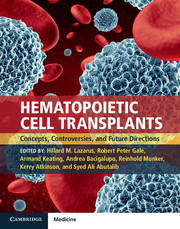Book contents
- Hematopoietic Cell TransplantsConcepts, Controversies, and Future Directions
- Hematopoietic Cell Transplants
- Copyright page
- Dedications
- Contents
- The Editors
- List of Contributors
- Preface
- Chapter 1 A Brief History of Hematopoietic Cell Transplantation
- Chapter 2 Current Use and Trends in Hematopoietic Cell Transplantation
- Chapter 3 Biology: Critical Components of Hematopoietic Cell Transplantation
- Section 1 Recipient Selection for Hematopoietic Cell Transplantation
- Section 2 Donor Selection for Allogeneic Hematopoietic Cell Transplants: A Moving Target
- Section 3 Collecting and Processing of the Graft
- Section 4 Early Post-Transplant Interval
- Section 5 Infections after Hematopoietic Cell Transplantation: Progress?
- Section 6 Late Complications of Hematopoietic Cell Transplantation
- Section 7 Other Complications of Hematopoietic Cell Transplants
- Section 8 Prevention, Detection, and Treatment of Relapse after Hematopoietic Cell Transplants
- Section 9 Selection of Conditioning Regimen and Challenges with Different Types of T-Cell Depletion Methods
- Section 10 Hematopoietic Cell Transplants for Acute Leukemia and Myelodysplastic Syndrome
- Chapter 31 Hematopoietic Cell Transplants for Children with Acute Lymphoblastic Leukemia
- Chapter 32 Hematopoietic Cell Transplants for BCR/ABL Negative Acute Lymphocytic Leukemia
- Chapter 33 Hematopoietic Cell Transplants for BCR/ABL Positive Acute Lymphocytic Leukemia
- Chapter 34 Hematopoietic Cell Transplants for Acute Myeloid Leukemia: Is There a Best Approach?
- Chapter 35 Hematopoietic Cell Transplants for Myelodysplastic Syndromes
- Section 11 Hematopoietic Cell Transplants for Myeloproliferative Neoplasms
- Section 12 Hematopoietic Cell Transplants for Lymphomas: Changing Indications
- Section 13 Plasma Cell Dyscrasias: Hematopoietic Cell Transplants
- Section 14 Autotransplants for Solid Neoplasms
- Section 15 Hematopoietic Cell Transplants for Non-Neoplastic Diseases
- Section 16 Novel Transplant Strategies
- Section 17 Novel Cell Therapies and Manipulations: Ready for Prime-Time?
- Index
- References
Chapter 35 - Hematopoietic Cell Transplants for Myelodysplastic Syndromes
from Section 10 - Hematopoietic Cell Transplants for Acute Leukemia and Myelodysplastic Syndrome
Published online by Cambridge University Press: 24 May 2017
- Hematopoietic Cell TransplantsConcepts, Controversies, and Future Directions
- Hematopoietic Cell Transplants
- Copyright page
- Dedications
- Contents
- The Editors
- List of Contributors
- Preface
- Chapter 1 A Brief History of Hematopoietic Cell Transplantation
- Chapter 2 Current Use and Trends in Hematopoietic Cell Transplantation
- Chapter 3 Biology: Critical Components of Hematopoietic Cell Transplantation
- Section 1 Recipient Selection for Hematopoietic Cell Transplantation
- Section 2 Donor Selection for Allogeneic Hematopoietic Cell Transplants: A Moving Target
- Section 3 Collecting and Processing of the Graft
- Section 4 Early Post-Transplant Interval
- Section 5 Infections after Hematopoietic Cell Transplantation: Progress?
- Section 6 Late Complications of Hematopoietic Cell Transplantation
- Section 7 Other Complications of Hematopoietic Cell Transplants
- Section 8 Prevention, Detection, and Treatment of Relapse after Hematopoietic Cell Transplants
- Section 9 Selection of Conditioning Regimen and Challenges with Different Types of T-Cell Depletion Methods
- Section 10 Hematopoietic Cell Transplants for Acute Leukemia and Myelodysplastic Syndrome
- Chapter 31 Hematopoietic Cell Transplants for Children with Acute Lymphoblastic Leukemia
- Chapter 32 Hematopoietic Cell Transplants for BCR/ABL Negative Acute Lymphocytic Leukemia
- Chapter 33 Hematopoietic Cell Transplants for BCR/ABL Positive Acute Lymphocytic Leukemia
- Chapter 34 Hematopoietic Cell Transplants for Acute Myeloid Leukemia: Is There a Best Approach?
- Chapter 35 Hematopoietic Cell Transplants for Myelodysplastic Syndromes
- Section 11 Hematopoietic Cell Transplants for Myeloproliferative Neoplasms
- Section 12 Hematopoietic Cell Transplants for Lymphomas: Changing Indications
- Section 13 Plasma Cell Dyscrasias: Hematopoietic Cell Transplants
- Section 14 Autotransplants for Solid Neoplasms
- Section 15 Hematopoietic Cell Transplants for Non-Neoplastic Diseases
- Section 16 Novel Transplant Strategies
- Section 17 Novel Cell Therapies and Manipulations: Ready for Prime-Time?
- Index
- References
- Type
- Chapter
- Information
- Hematopoietic Cell TransplantsConcepts, Controversies and Future Directions, pp. 328 - 338Publisher: Cambridge University PressPrint publication year: 2000



